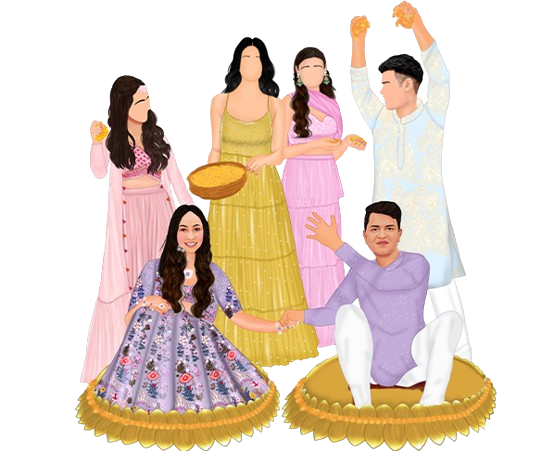Advertisement
By IS Team
Creative Wedding Reception Invitation Phrases For 2024
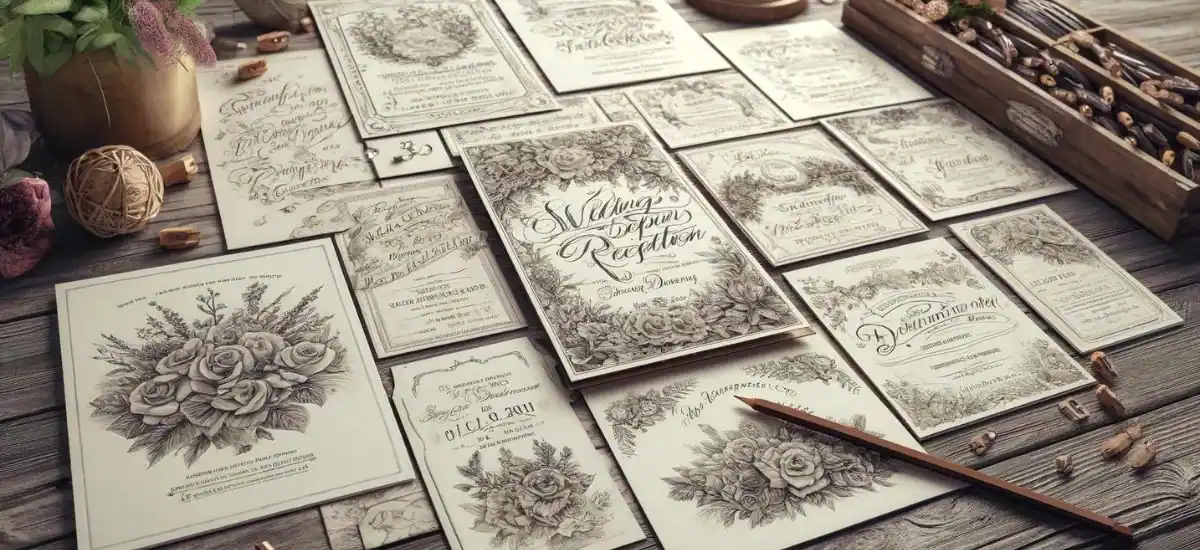
Advertisement
Crafting the perfect wedding reception invitation wording is essential for setting the tone of your special day. Whether you opt for a formal black-tie affair or a casual, intimate gathering, your invitation should reflect the event's atmosphere and your personality.
Remember, the key is in the details: from the names of the hosts to the date, time, and location. Personal touches like incorporating a meaningful quote or your unique love story can make your invitations truly stand out.
Ensure your wording is not only informative but also warmly invites your guests to celebrate this joyous occasion with you. 🥂
The Basics of Wedding Reception Invitation Wording
Advertisement
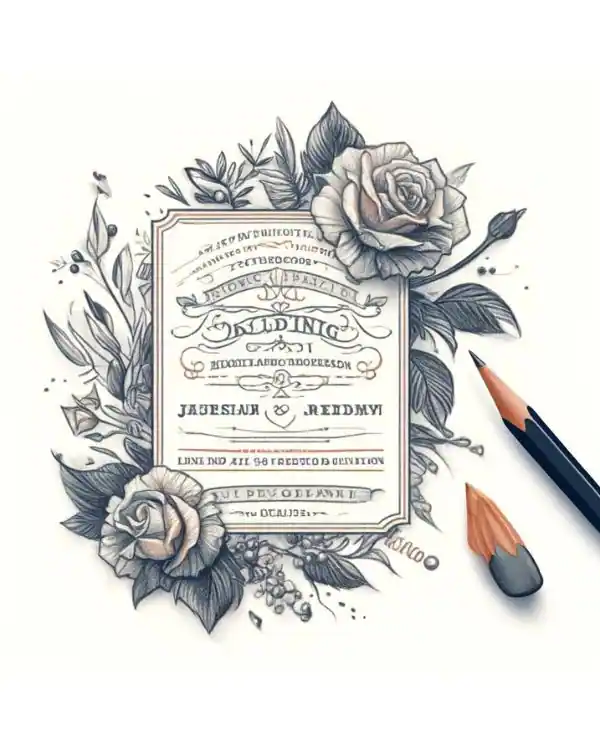
Components of a Wedding Reception Invitation
Every wedding invitation is essential for guiding your guests through the event details. Here's how to craft yours:
Date, Time, and Location: Ensure these details are clearly stated so your guests can plan accordingly and arrive on time.
Names of the Hosts: Typically, the invitation starts with the hosts' names, showing who is inviting the guests. This could be the couple themselves or their parents.
Invitation to Join: The wording here sets the event's tone. Use “request the honor of your presence” for formal settings or “invite you to join the celebration” for a casual vibe.
These elements make your invitation not only informative but also a welcoming introduction to your wedding celebration.
Etiquette and Tone
- Formal vs. Informal Wording Styles: Decide early whether your reception will be a black-tie affair or a casual get-together. 🎩✨
- The Role of Tone: Your wording reflects the overall vibe of your event, whether it’s elegantly formal or breezily informal.
Traditional Wording Examples
For Formal Receptions
Formal wedding receptions often call for a dignified and elegant tone in the invitation wording. Here are some examples:
Example Wordings for a Black-Tie Event:
- "We request the honor of your presence at the marriage celebration of [Bride’s Name] and [Groom’s Name]."
- "You are cordially invited to attend the formal wedding reception of [Bride’s Name] and [Groom’s Name], as they celebrate their union."
- "The pleasure of your company is requested at the wedding reception of [Couple’s Names] on [Date]."
Honoring Deceased or Divorced Parents: When including a tribute to deceased or divorced parents, the wording should be respectful and thoughtful:
- "In loving memory of [Parent’s Name], [Bride’s Name] and [Groom’s Name] invite you to share in their joy."
- "[Bride’s Name], daughter of [Mother’s Name] and the late [Father’s Name], and [Groom’s Name] request your presence..."
- "Together with their families, [Bride’s Name], daughter of [Mother’s Name] and [Divorced Father’s Name], and [Groom’s Name] invite you..."
For Casual Receptions
Casual receptions often feature a more relaxed and personal invitation style. Here are creative examples:
Creative and Relaxed Wording Examples:
- "Join us for a night of merriment as [Bride’s Name] and [Groom’s Name] celebrate their love."
- "Let’s toast to love and laughter! Come celebrate with [Bride’s Name] and [Groom’s Name]."
- "We’re tying the knot! Join [Bride’s Name] and [Groom’s Name] for a celebration of love and friendship."
Tips for Making Informal Invites Still Feel Special: Personal touches make informal invites special. Consider including:
- Personal anecdotes or quotes about the couple’s relationship.
- A fun RSVP card that reflects the couple’s personalities or interests.
- A special request, like wearing a color or accessory that means something to the couple.
By selecting the appropriate wording and incorporating personal touches, you can create an invitation that beautifully sets the tone for your reception, whether it's formal or casual.
Cultural Variations in Invitation Wording
Advertisement
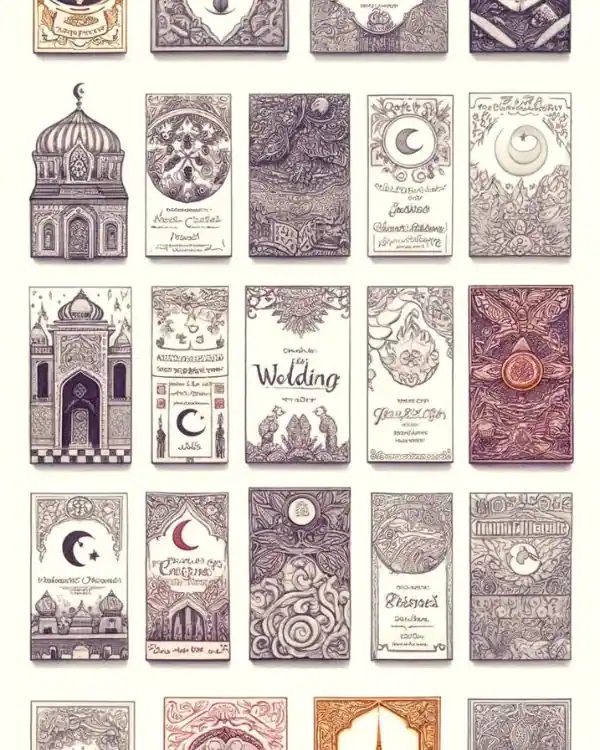
Western Wedding Reception Invitations
Western wedding invitations typically feature direct and straightforward phrasing that emphasizes the honor of the guest’s presence and the joy of the celebration. Here are some examples:
- "The pleasure of your company is requested at the wedding reception of [Bride’s Name] and [Groom’s Name]."
- "[Bride’s Name] and [Groom’s Name] joyfully invite you to their wedding celebration on [Date]."
- "Please join us for the wedding reception of [Bride’s Name] and [Groom’s Name] as they celebrate their union."
- "You are cordially invited to celebrate the marriage of [Couple’s Names] at their reception."
- "Celebrate our love and commitment at our wedding reception on [Date]. Your presence will honor us."
Eastern Wedding Reception Invitations
In many Asian cultures, wedding invitations are imbued with rich symbolism and respect, often incorporating blessings for the couple or poetic language. Here are some examples:
- "[Bride’s Name] and [Groom’s Name], together with their families, invite you to share in their joy and blessings as they unite in marriage."
- "We invite you to witness our vows and bless our union under the grace of [Cultural/Religious Symbol] on [Date]."
- "Join us to celebrate love and harmony as [Bride’s Name] and [Groom’s Name] are bonded for eternity. Blessings to our families and friends."
- "With hearts full of love and rooms full of joy, we, [Bride’s Name] and [Groom’s Name], invite you to our wedding reception."
- "Your presence is requested to bless and celebrate the marriage of [Bride’s Name] and [Groom’s Name] according to [Cultural Tradition]."
Interfaith Wedding Reception Invitations
Interfaith wedding invitations often strive to respectfully blend different cultural and religious traditions. Here are some thoughtful ways to harmonize these backgrounds:
- "[Bride’s Name], daughter of [Bride’s Parents’ Names] and [Groom’s Name], son of [Groom’s Parents’ Names], invite you to celebrate their love and union, embracing both [Culture/Religion A] and [Culture/Religion B] traditions."
- "Join us on [Date], as we, [Bride’s Name] and [Groom’s Name], unite our lives and traditions in a celebration of love and faith."
- "With joy and reverence, [Bride’s Name] and [Groom’s Name] request the honor of your presence at their wedding ceremony, blending the rich traditions of [Culture A] and [Culture B]."
- "Celebrate with us as we bring together our families, our cultures, and our hearts in marriage. [Bride’s Name] and [Groom’s Name], along with their families, warmly invite you."
- "We, [Bride’s Name] and [Groom’s Name], invite you to witness our vows and celebrate our unity, as we honor both [Religious/Cultural Background A] and [Religious/Cultural Background B]."
By carefully selecting wording that honors both the individual and shared traditions, couples can craft invitations that reflect their unique cultural heritages and shared future.
Modern and Unique Invitation Wording Ideas
Themed Wedding Invitations
Themed weddings allow you to personalize your special day with details that truly represent your style and passions. Here are some wording ideas tailored to popular themes:
Beach Theme
- "Tide the Knot with us! Join [Bride’s Name] and [Groom’s Name] at the shore for a wave of love and fun."
- "Bare feet, salty air, and a promise to share. Celebrate our beachside wedding on [Date]."
Rustic Theme
- "Join us in the heart of nature as [Bride’s Name] and [Groom’s Name] plant their roots together. Let's celebrate rustic style!"
- "Feel the charm of the countryside as we unite in marriage under the rustic skies on [Date]."
Vintage Theme
- "Step back in time and witness our love story unfold in vintage style on [Date]. [Bride’s Name] and [Groom’s Name] warmly invite you."
Funny and Quirky Wording
Injecting humor into your wedding invitations can set a joyful tone for your event. Here are some witty and humorous examples:
- "We decided on forever... and a day. Join us on [Date], and bring your dancing shoes!"
- "Eat, drink, and be married! Celebrate with [Bride’s Name] and [Groom’s Name] as they tie the knot and untie the fun."
- "Are we really doing this? Yep! Come watch us say ‘I do’ and party too!"
- "Lock in our wedding date because we're ready to gatecrash your schedule on [Date]!"
- "It’s a love thing, and you’re invited to join the party! Be there when [Bride’s Name] and [Groom’s Name] mix love, laughter, and happily ever after."
Using theme-specific phrases or humorous lines in your wedding invitations not only informs guests about the event but also gives them a hint of the fun and uniqueness to expect. These creative touches ensure your invitation stands out and sets a festive tone for your wedding.
Tips for Personalizing Your Wedding Reception Invitations
Advertisement
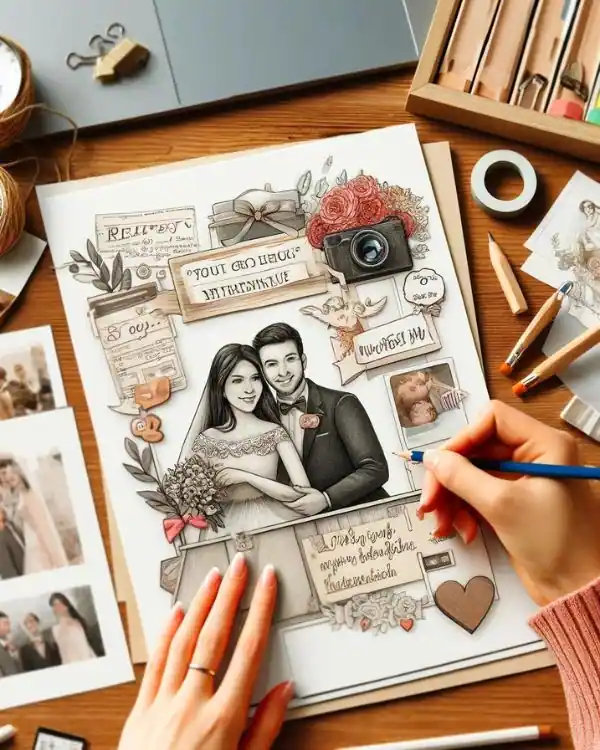
Incorporating Personal Touches
Personalizing your wedding invitations not only shares details about the event but also your love story. Here's how you can make your invitations uniquely yours:
How to Include Personal Stories or Quotes
- Narrate Your Journey: "From our first date at [Place] to saying 'yes' under the stars, join us as we step into our next chapter together."
- Share a Memorable Quote: "‘Love recognizes no barriers. It jumps hurdles, leaps fences, penetrates walls to arrive at its destination full of hope.’ —Maya Angelou. Like our love, let nothing stop you from celebrating with us."
The Importance of Personalization
Personalized invitations create a connection and anticipation among your guests. They're not just attending a wedding; they're part of a love story.
Language and Love
Elevate your invitations with poetic language or famous love quotes that reflect the depth of your feelings.
Using Poetic Language or Famous Love Quotes
- Poetic Invitation: "Join us under the moonlight where our hearts align and our forever begins."
- Inspirational Love Quote: "‘Love is not just looking at each other, it’s looking in the same direction.’ —Antoine de Saint-Exupéry. Witness our paths unite."
Examples of Poetic and Impactful Phrases
- "In the constellation of our lives, we have found a mutual star. Celebrate as we orbit into matrimony."
- "Our hearts speak the same language of love. Be our guest as we converse in vows."
- "Together, we write our greatest adventure. You’re invited to turn the page with us as we vow forever."
- "Amidst the symphony of our souls, we found harmony. Join us as we compose our future."
- "From solitary sparks to a radiant flame, witness the glow of our united hearts."
By infusing your invitations with personal stories, poetic language, and meaningful quotes, you create an immersive experience that begins with the envelope. These touches not only delight but also deeply engage your guests in the celebration of your union.
Practical Considerations
Advertisement
When planning a wedding, practical details are as crucial as the aesthetics of your invitations. Here’s how to handle the timing, accuracy, and RSVP processes effectively.
Timing and Information Accuracy
Best Practices for Sending Invitations:
Timing is crucial when sending out your wedding invitations. It’s recommended to send invitations 8-12 weeks before the wedding date. This gives guests ample time to arrange travel and accommodation if needed.
Ensuring All Information is Accurate and Clear:
Double-check every detail. Confirm that dates, times, and locations are correct before your invitations are printed. A typo can cause confusion and inconvenience, so meticulous review is key. Ensure that the venue’s address is accurate and consider including a map or directions for venues that are hard to locate.
RSVP Etiquette
How to Phrase RSVP Requests: RSVPs are vital for final headcounts and planning. Phrase your RSVP requests clearly and kindly:
- “Please let us know if you’ll be able to join us by [RSVP Date].”
- “Your presence would delight us! Kindly confirm by [RSVP Date].”
Advertisement
Managing RSVPs Effectively:
Keep a detailed list to track who has responded and who hasn’t. Consider using digital tools or apps designed for event planning to streamline this process. If necessary, follow up with guests who haven’t responded as the RSVP deadline approaches. This ensures you have an accurate count for seating arrangements, catering, and other logistical elements.
By focusing on timely and clear communication and managing RSVPs efficiently, you can significantly reduce stress and ensure your wedding planning proceeds smoothly.
In crafting your wedding reception invitations, remember that each word is a reflection of your story and excitement for the future. Use this guide to create invitations that not only inform but also inspire and delight your guests. Here’s to a celebration that starts with the perfect invitation! 🥂
FAQ: Wedding Reception Invitation Wording
1. How far in advance should I send out wedding reception invitations?
Ideally, send your wedding reception invitations 8 to 12 weeks before the event. This allows guests ample time to RSVP and make necessary travel arrangements.
2. Can I include a dress code in the wedding reception invitation?
Absolutely! Clearly stating the dress code, such as "black tie," "cocktail attire," or "casual dress," helps ensure guests feel comfortable and appropriately dressed for your celebration.
3. Should we include our wedding website on the invitation?
Yes, including your wedding website on the invitation is a great way to provide guests with additional information, such as accommodation options, directions, and updates about the wedding day.
4. What is the best way to handle plus-one invitations? Specify on the invitation or RSVP card whether a guest is invited with a plus-one. This clarity helps manage expectations and assists in your final headcount planning.
Advertisement
I'm Looking For!
